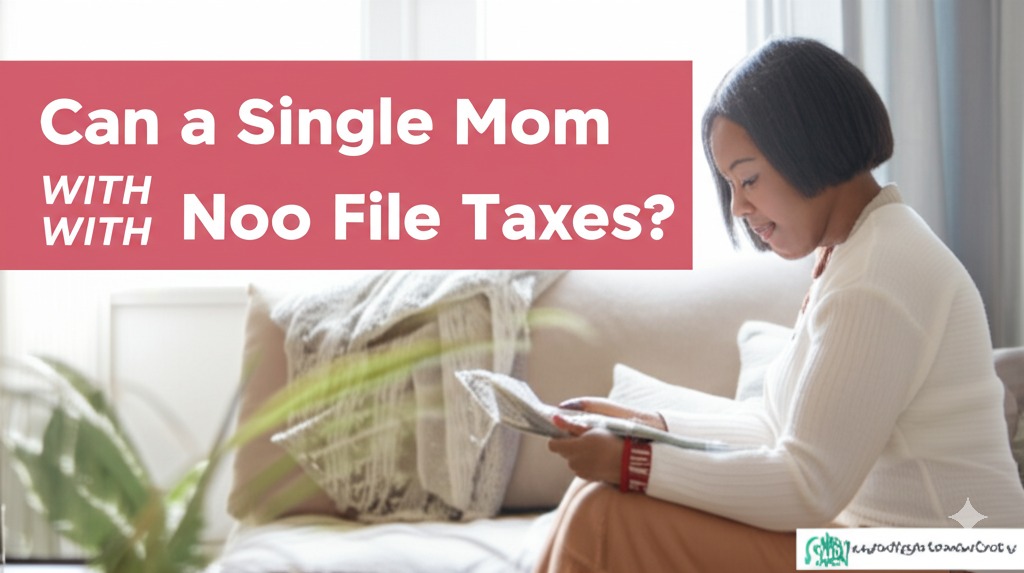
Life as a single mom comes with many challenges—from juggling parenting alone to managing finances with little or no income. One common question that arises is: can a single mom with no job file taxes? The short answer is yes—but there’s more to it than meets the eye.
Even if you’re unemployed, filing taxes as a single mother can open doors to valuable tax credits and refunds. In this guide, we’ll break down everything you need to know about your tax-filing rights, benefits, and what steps to take if you’re currently without a job.
Why Filing Taxes Still Matters—Even Without a Job
You might think there’s no need to file taxes if you didn’t earn any income. But in reality, filing your taxes can lead to financial support you might not know you’re eligible for.
Key Reasons to File Taxes With No Income
- Claim refundable tax credits
- Start or continue eligibility for future benefits
- Receive a tax refund even if no taxes were paid
- Document your financial status for government aid
If you’re a single mom with no income, filing taxes can make a difference in your financial stability, both now and in the future.
Who Qualifies to File Taxes With No Job?
The IRS doesn’t require everyone to file taxes, especially if your income is below the filing threshold. However, you can still file voluntarily to access certain benefits.
You can file taxes if:
- You are a U.S. citizen or resident alien
- You have a valid Social Security number
- You lived in the U.S. for more than half the year
- You are claiming a dependent, like your child
If these conditions apply to you, you’re likely eligible to file—even with zero income.
Tax Credits That Can Help Single Moms With No Job
Even without employment, some tax credits are refundable, which means you could receive money back from the IRS.
1. Earned Income Tax Credit (EITC)
Typically, the EITC requires earned income, so if you had zero income all year, you may not qualify. But if you had even a small amount of income—like from part-time gigs or self-employment—you could still be eligible.
2. Child Tax Credit (CTC)
For the 2023 tax year, the CTC offers up to $2,000 per qualifying child under age 17. Even if you have no tax liability, you may still be eligible for a partial refund through the Additional Child Tax Credit (ACTC).
3. Recovery Rebate Credit
If you missed any stimulus payments, you can still claim them as a Recovery Rebate Credit when you file.
4. American Opportunity Credit (for Education)
If you’re a single mom attending college or vocational school, this credit can cover qualified education expenses—even if you didn’t earn income.
How to File Taxes With No Income
Step 1: Gather Your Documents
Even without income, you’ll need:
- Your Social Security number
- Social Security numbers for your dependents
- Any documents related to prior income or benefits (e.g., 1099 forms, school grants, etc.)
Step 2: Choose a Filing Method
You can file your taxes:
- Online with IRS Free File (for incomes under $73,000)
- Through a local Volunteer Income Tax Assistance (VITA) site
- With tax software like TurboTax or H&R Block
- By working with a tax professional
Step 3: Submit Your Return
Even if your income is zero, submit your return to potentially claim credits and receive a refund check or direct deposit.
What If You Received Government Assistance?
If you received aid such as TANF, SNAP, or unemployment benefits, here’s what you need to know:
- SNAP and TANF are not considered taxable income.
- Unemployment benefits are taxable, and you should receive a 1099-G form.
- Government assistance doesn’t disqualify you from filing or claiming certain credits.
Can Filing Taxes Help You Qualify for Other Support?
Absolutely. Filing taxes can help you:
- Show eligibility for housing assistance or rental programs
- Apply for health insurance subsidies through the marketplace
- Prove financial need for scholarships and grants
- Establish a record that may help in child custody or court-related financial matters
Common Myths Debunked
Let’s clear up some misunderstandings.
❌ Myth: I have no income, so I can’t file taxes.
✅ Truth: You can file voluntarily and still qualify for certain refunds.
❌ Myth: I won’t get anything back.
✅ Truth: Refundable tax credits may put money in your pocket—even if you didn’t pay taxes.
❌ Myth: Filing taxes costs money.
✅ Truth: Many free tax filing options are available for low-income individuals.
Final Thoughts: Take Control of Your Finances
So, can a single mom with no job file taxes? Yes—and in many cases, she should.
Even without earned income, filing your taxes can unlock important financial support, especially through refundable credits and benefits. It also puts you in a stronger position for other aid and future opportunities.
Don’t miss out. File your taxes this season—even if your income is zero. Use free tools, seek out community help, and take the first step toward building a more stable financial future for you and your child.

Andre Cuevas provides career insights, job search strategies, and professional advice to help individuals navigate the job market and achieve their career goals.




